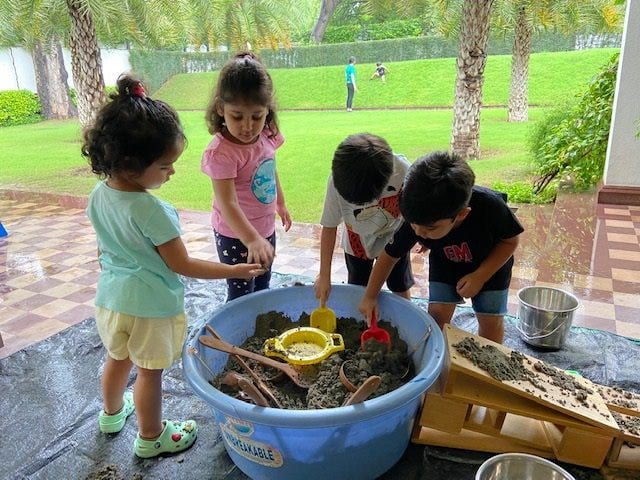Sensory play isn’t just about using your senses as there are so many other things you can do with it. As children play, they use their senses (touch, sight, hearing, smell, and sometimes taste) to explore and discover the world around them. Children engage with a variety of materials, textures, colors, sounds, and smells, which helps them develop their brains, learn new things, and have fun. From the touch of sand between fingers to the scent of freshly baked cookies, sensory play provides invaluable opportunities for children to explore, create, and make sense of the world. Sensory play is important and it impacts a child’s overall development.
The senses of children are not fully developed when they are born. They mature with experience over time. Throughout their lives, each new experience builds nerve connections and advances development. Engaging in sensory play also involves the proprioceptive and vestibular systems. The proprioceptive system sense refers to awareness of one’s body. It helps kids determine how much force they need to use when playing with objects/toys. The vestibular system allows children to maintain balance while playing. With the connection of more nerves and growth in their systems, there are benefits in cognitive development, emotional growth, and language development.
Sensory play lays a strong foundation for cognitive development in children. As they manipulate objects, explore different materials, and experiment with cause and effect, they develop problem-solving skills, critical thinking abilities, and scientific inquiry. Sensory play promotes the development of neural connections and enhances memory and concentration. For instance, pouring water from one container to another and observing the changes in water levels fosters an understanding of volume, measurement, and mathematical concepts. By engaging in open-ended activities, children are encouraged to explore, hypothesize, and make discoveries, fostering a love for learning that extends beyond the sensory play experience.
Emotional and social development is also influenced by sensory play. It provides an outlet for self-expression, emotional regulation, and stress relief. Through sensory experiences, children can communicate their emotions and feelings, whether it be joy, excitement, or frustration. Furthermore, sensory play often involves collaboration, cooperation, and turn-taking, allowing children to develop vital social skills. Sharing materials, negotiating roles, and engaging in pretend play fosters empathy, communication, and teamwork. Sensory play can also be an inclusive activity, providing opportunities for children with different abilities to participate and interact on an equal footing, fostering a sense of belonging and acceptance.
Language development can be facilitated through sensory play. As children explore and engage in sensory experiences, they encounter new words, concepts, and vocabulary. They communicate their observations, preferences, and experiences, expanding their expressive and receptive language skills. This language-rich environment strengthens communication skills, promotes active listening, and nurtures early literacy skills.
Sensory play can be an exciting activity for children to develop their senses, awareness, and balance, ultimately impacting a child’s development.
All Blogs are written by Professionals in the fields of Nutrition, Human Development and Diabetes.
